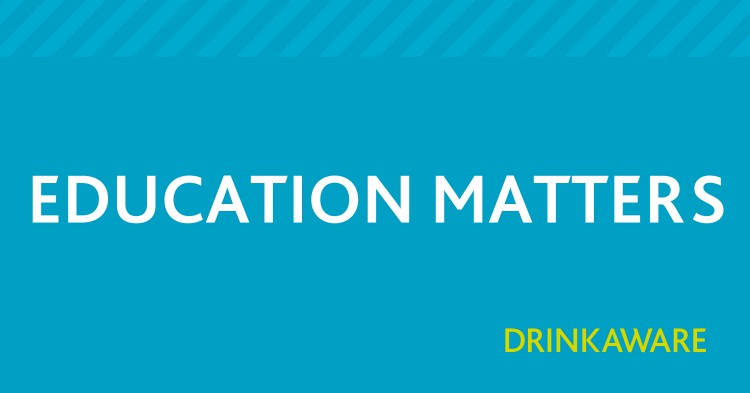With Irish children as young as 13 years having their first alcoholic drink and almost one in five 12-14-year-olds having reported being drunk1, the need to educate and inform young people about alcohol is a societal imperative and for Drinkaware, a priority. Research commissioned by Drinkaware with 200 Junior Cycle Third Year students2 indicates that over half (56%) are limited in their knowledge of alcohol use while 61% reported being ‘very interested’ in learning more about ‘how to stay safe and alcohol free’.
While we should not expect schools to solve or take full responsibility for the prevention of problems confronting young people today, schools have an influential role to play in the alcohol education of young people. To this point, the Education Act (1998)3 requires schools to provide health education for students.
Young people who are not engaged with learning and have poor relationships with teachers and peers are more at risk of using alcohol and drugs, developing anxiety and depression and dropping out of school.4 Alcohol education programmes, as part of school health education, can play an important role in delaying the age of first drink, aiming to impact students’ attitudes and behaviours relating to alcohol, if and when they choose to drink, and prevent the development of alcohol related problems and harms.
Explore our work in education in our Schools hub
DOES ALCOHOL EDUCATION IN SCHOOL WORK?
In short, yes. Alcohol education programmes in schools have been shown to work well, by impacting students’ attitudes and behaviours relating to alcohol, playing a part in delaying the age of first drink.5 A range of factors were found to contribute to disappointing outcomes in the past including:
- Not implementing the programme as intended, either by omitting important components or by modifying aspects that were central to the underlying aims
- Programme reliance on providing knowledge about consequences of alcohol use hoping it would encourage young people to behave appropriately in relation to alcohol and other substances
- A mismatch between programme content and the experiences of young people at whom they were aimed.
The Department of Health strategy, Reducing Harm, Supporting Recovery – A health led response to alcohol and drug use in Ireland, 2017-20256 recognises that that future prevention programmes should be evidence-led and informed.
Read about our evidence-informed Alcohol Education Programme for junior cycle
EFFECTIVE SCHOOL ALCOHOL EDUCATION
Drinkware commissioned Mark Morgan, Cregan Professor of Education and Psychology at St. Patrick’s College7, to undertake research to identify the most effective practices to consider when delivering alcohol education in schools. These included:
- Evaluations with strong designs (which show decreases in reported consumption by young people not only in the immediate aftermath but for some time later).
- Implementing a whole school approach, including the wider school community.
- Implementing the programme as intended.
- Programme delivery by trained, competent and committed teachers using interactive teaching style involving student input and engagement.
- The programme should enable young people develop relevant social skills to cope with various pressures to drink alcohol.
- Link with other curricular areas, especially those with a social and personal content.
- Engage a positive rather than a punitive or scary approach, with emphasis on learning outcomes and harm reduction as opposed to abstinence.
Read more about best practice principals for alcohol education
Drinkaware recognises that schools and parents can play an important role in the alcohol education of young people. Positive change can only happen through collaboration and we know parents and teachers are key sources of education and role modelling for young people regarding alcohol.
REFERENCES
- Kelly, C., A., Molcho, M and Nic Gabhainn, S. (2012) The Irish Health Behaviour in School-aged children (HBSC) Study 2010 Department of Health and National University of Ireland, Galway.
- Behaviours and Attitudes (2016) Alcohol Education: Is it meeting the needs of Junior Certificate students? A Drinkaware commissioned report.
- Government of Ireland Education Act. Dublin, The Stationery Office, 1998.
- Shochet, I. M., Smith, C. L., Furlong, M. J. & Homel, R. 2011. A prospective study investigating the impact of school belonging factors on negative affect in adolescents. Journal of Clinical Child & Adolescent Psychology, 40, 586-595.
- Foxcroft, D.R. & Tsertsvadze, (A). (2011). Universal school-based prevention programs for alcohol misuse in young people. Cochrane Database of Systematic Reviews, Issue 5.
- Department of Health (2017) Reducing Harm Supporting Recovery: A health-led response to drug and alcohol use in Ireland 2017-2025.
- Morgan. M. (2016) Prevention Programmes and Alcohol: An Overview with Recommendations. A Drinkaware commissioned report.


